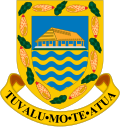Queen of Tuvalu
| Queen of Tuvalu | |
|---|---|

|
|
| Incumbent | |
 |
|
| Elizabeth II | |
| Details | |
| Style | Her Majesty |
| Heir apparent | Charles, Prince of Wales |
| First monarch | Elizabeth II |
| Formation | 1 October 1978 |
The monarchy of Tuvalu is a system of government in which a hereditary monarch is the sovereign and head of state of Tuvalu. The present monarch of Tuvalu is Queen Elizabeth II, who is also the Sovereign of 15 other Commonwealth realms. The Queen's constitutional roles are mostly delegated to the Governor-General of Tuvalu.
Royal succession is governed by the English Act of Settlement of 1701, which is part of constitutional law.
Fifty-four states are members of the Commonwealth of Nations. Sixteen of these countries are specifically Commonwealth realms who recognise, individually, the same person as their Monarch and Head of State; Tuvalu is one of these. Despite sharing the same person as their respective national monarch, each of the Commonwealth realms—including Tuvalu—is sovereign and independent of the others.
The Balfour Declaration of 1926 provided the Dominions the right to be considered equal to Britain, rather than subordinate; an agreement that had the result of, in theory, a shared Crown that operates independently in each realm rather than a unitary British Crown under which all the dominions were secondary. The Monarchy thus ceased to be an exclusively British institution, although it has often been called "British" since this time (in both legal and common language) for reasons historical, legal, and of convenience. The Royal and Parliamentary Titles Act, 1927 was the first indication of this shift in law, further elaborated in the Statute of Westminster 1931.
Tuvalu achieved independence in 1978 but retained the Queen as Head of State. Under the Statute of Westminster, Tuvalu has a common monarchy with Britain and the other Commonwealth realms.
...
Wikipedia
